THE FREE STATERS’ LAST STAND.
SLAP KRANZ.
At last the blow has fallen which has shattered the Boer cause in the Free State. There will be skirmishes with scattered bands in the mountain gorges beyond Harrismith, but the backbone of the Republic has been broken beyond redemption. Sunday, the 30th of July, was big with fate, though we who sat almost within the shadow of the snow enshrouded hills of savage Basutoland at the dawning of that day knew it not. It was a joyful day for us, though pregnant with sorrow for the veldtsmen who had fought so long and well for their doomed cause, for on that day our generals reaped the harvest which they had sown with infinite patience and undaunted courage. General Hunter, to whom the chief command had just been given, was there, surrounded by his staff, a soldierly figure worthy of a nation’s trust; Clements, keen faced, sharp voiced, with alertness written in each lineament; Paget, whose fiery spirit spoke from his mobile face, his blood, hot as an Afghan sun, flashing the workings of his mind into his face as sunlight flashes from steel; and Rundle, hawk-eyed and stern, no friend to Pressmen, but a soldier every inch, one of those men whose hands build empires. Had he been stripped of modern gear that day, and placed in Roman trappings, one would have looked behind him to see if Caesar meant to grace the show; but Caesar was not there.
One of the greatest soldiers since the world began was missing from our ranks, the hero Roberts, whose great intellect had planned the coup which his generals had carried to maturity. Yet, though Lord Roberts planned each general move, an immense amount of actual work was left to the generals. The country they had to pass through was rugged and inhospitable. The foe they had to fight was brave, resourceful, and well supplied with all munitions of war; a single mistake on the part of any one of them would have wrecked the magnificent plan of the Commander-in-Chief. But no mistakes were made; each general worked as if his soul’s salvation depended upon his individual efforts. Where all are good, as a rule it is hard to make a distinction; but in this instance one man stands out above his fellows, and that man is General Sir Leslie Rundle, the commander of the Eighth Division. His task from the first was herculean. He had to hold a line fully one hundred miles in length; day after day, week after week, the enemy tried to break that line and pour their forces into the territory we had conquered.




